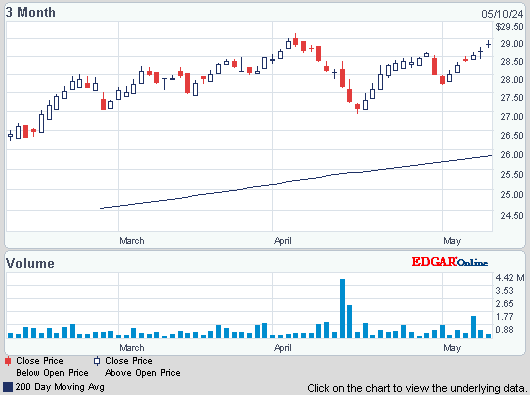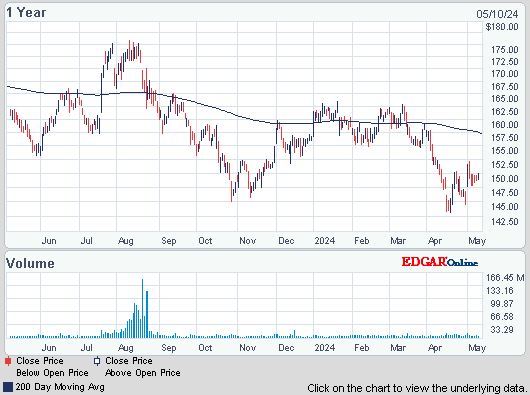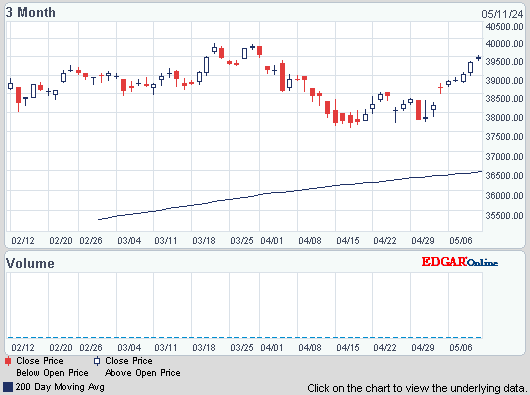Dow polled back 60, advancers over decliners 2-1 & NAZ was up 3. The MLP index jumped 4+ to the 458s & the REIT index went up 1+ to the 273s. Junk bond funds were higher but Treasuries were did little. Oil & gold were flattish.
AMJ (Alerian MLP Index tracking fund)

The IMF raised its forecast for global growth this year as expansions in the US & UK accelerate, & urged advanced economies to maintain monetary accommodation to strengthen the recovery. The global economy should grow 3.7% this year, compared with an Oct estimate of 3.6%. US GDP will expand 2.8%, compared with 2.6%; Japan will gain 1.7% versus 1.2%; & the UK will increase 2.4% from 1.9%. “In advanced economies, output gaps generally remain large and, given the risks, the monetary policy stance should stay accommodative while fiscal consolidation continues,” the IMF said in the report. “In many emerging market and developing economies, stronger external demand from advanced economies will lift growth, although domestic weaknesses remain a concern.” China, the world’s 2nd-largest economy, is projected to grow 7.5%, faster than the 7.3% prediction in Oct, after 7.7% last year. Central banks in the US, Japan & the euro area face inflation levels under their targets while trying to accelerate growth with policies including benchmark interest rates near zero & bond-buying programs. The Federal Reserve announced plans last month to taper monthly asset purchases to $75B from $85 B, citing improvement in the labor market. The IMF said in a prepared statement that the fund expects the benchmark interest rate will rise in 2015. Among the new risks to advanced economies, the IMF cited “very low inflation,” particularly in the euro area, as becoming more significant & raising the prospect that longer-term inflation expectations could head lower. “This raises the risks of lower-than-expected inflation, which increases real debt burdens, and of premature real interest rate increases, as monetary policy is constrained in lowering nominal interest rates,” the IMF said. “It also raises the likelihood of deflation in the event of adverse shocks to activity.” In the US, “the pickup in 2014 will be carried by final domestic demand, supported in part by a reduction in the fiscal drag as a result of the recent budget agreement. But the latter also implies a tighter projected fiscal stance in 2015.” “The euro area is turning the corner from recession to recovery,” it said, adding that the improvement is likely to be more modest in economies still under stress.
IMF Raises Global Outlook as Advanced Nations Accelerate
Johnson & Johnson, a Dow stock & Dividend Aristocrat, reported Q4 profit that beat estimates as demand for the company’s newest drugs accelerated EPS gained 37% to $1.23 from 91¢ a year earlier. EPS excluding one-time items beat by 3¢ the $1.20 estimate. Results benefited from a tax benefit of 25¢ per share. JNJ has brought new medicines to the market the past 2 years while it integrated the 2012 acquisition of closely held device maker Synthes. The company last week received a $4.15B offer for its lone diagnostics division from Carlyle Group, following competitors such as Pfizer (PFE), another Dow stock, in divesting units that aren’t market leaders. The company forecast 2014 EPS of $5.75-$5.85, excluding one-time items. But the outlook was below the $5.86 estimate expected by analysts. Q4 revenue increased 4.5% to $18.4B from $17.6B a year earlier. Sales of the troubled consumer goods, which includes Tylenol & Motrin, climbed 2.8% to $3.75B as progress was made in returning recalled products to US store shelves. The stock dropped 1.80 after a good run last year..
Johnson & Johnson’s Quarterly Profit Rises on Drug Demand

Photo: Bloomberg
America’s shale boom is providing an unintended benefit to US gov bonds. With the US economy is relying less on oil & gas imports than at any time in 2 decades, energy expenses for Americans have fallen & cut into inflation more than any other living cost in the past year, according to the Labor Dept. Consumer prices are expected to rise less than 2% for a 2nd straight year in 2014, the first time that’s happened during an expansion in a half century. Slowing inflation, which increases the purchasing power of fixed-rate payments, would give support to Treasuries after the Federal Reserve plans to curtail its unprecedented bond buying ignited their first annual losses since 2009. 10 year notes yielded 1.76% last month after deducting inflation, close to the highest since 2011. Spending fewer dollars on foreign oil also means that any gain in crude prices no longer leads to a weaker greenback, upending a decade-long relationship that may strengthen the value of US assets.
Dow is lower from Travelers (TRV), Intel (INTC) & GE (GE), each down over 1½%. But otherwise stocks are doing well along with yield sensitive stocks. An encouraging forecast from the IMF is always welcome by the bulls. But earnings keep coming & they tend to be drab. Dow is down 230 in Jan, not a good sign for the rest of the year.
Dow Jones Industrials

AMJ (Alerian MLP Index tracking fund)
Treasury yieds:
U.S. 3-month |
0.03% | |
U.S. 2-year |
0.37% | |
U.S. 10-year |
2.83% |
| CLG14.NYM | ...Crude Oil Feb 14 | .............94.85 | (0.5%) |
| ZGG14.CBT | .....Gold 100 oz. Feb 14 | ...1,252.70 | (0.1%) |
The IMF raised its forecast for global growth this year as expansions in the US & UK accelerate, & urged advanced economies to maintain monetary accommodation to strengthen the recovery. The global economy should grow 3.7% this year, compared with an Oct estimate of 3.6%. US GDP will expand 2.8%, compared with 2.6%; Japan will gain 1.7% versus 1.2%; & the UK will increase 2.4% from 1.9%. “In advanced economies, output gaps generally remain large and, given the risks, the monetary policy stance should stay accommodative while fiscal consolidation continues,” the IMF said in the report. “In many emerging market and developing economies, stronger external demand from advanced economies will lift growth, although domestic weaknesses remain a concern.” China, the world’s 2nd-largest economy, is projected to grow 7.5%, faster than the 7.3% prediction in Oct, after 7.7% last year. Central banks in the US, Japan & the euro area face inflation levels under their targets while trying to accelerate growth with policies including benchmark interest rates near zero & bond-buying programs. The Federal Reserve announced plans last month to taper monthly asset purchases to $75B from $85 B, citing improvement in the labor market. The IMF said in a prepared statement that the fund expects the benchmark interest rate will rise in 2015. Among the new risks to advanced economies, the IMF cited “very low inflation,” particularly in the euro area, as becoming more significant & raising the prospect that longer-term inflation expectations could head lower. “This raises the risks of lower-than-expected inflation, which increases real debt burdens, and of premature real interest rate increases, as monetary policy is constrained in lowering nominal interest rates,” the IMF said. “It also raises the likelihood of deflation in the event of adverse shocks to activity.” In the US, “the pickup in 2014 will be carried by final domestic demand, supported in part by a reduction in the fiscal drag as a result of the recent budget agreement. But the latter also implies a tighter projected fiscal stance in 2015.” “The euro area is turning the corner from recession to recovery,” it said, adding that the improvement is likely to be more modest in economies still under stress.
IMF Raises Global Outlook as Advanced Nations Accelerate
Johnson & Johnson, a Dow stock & Dividend Aristocrat, reported Q4 profit that beat estimates as demand for the company’s newest drugs accelerated EPS gained 37% to $1.23 from 91¢ a year earlier. EPS excluding one-time items beat by 3¢ the $1.20 estimate. Results benefited from a tax benefit of 25¢ per share. JNJ has brought new medicines to the market the past 2 years while it integrated the 2012 acquisition of closely held device maker Synthes. The company last week received a $4.15B offer for its lone diagnostics division from Carlyle Group, following competitors such as Pfizer (PFE), another Dow stock, in divesting units that aren’t market leaders. The company forecast 2014 EPS of $5.75-$5.85, excluding one-time items. But the outlook was below the $5.86 estimate expected by analysts. Q4 revenue increased 4.5% to $18.4B from $17.6B a year earlier. Sales of the troubled consumer goods, which includes Tylenol & Motrin, climbed 2.8% to $3.75B as progress was made in returning recalled products to US store shelves. The stock dropped 1.80 after a good run last year..
Johnson & Johnson’s Quarterly Profit Rises on Drug Demand
Johnson & Johnson (JNJ)
America’s shale boom is providing an unintended benefit to US gov bonds. With the US economy is relying less on oil & gas imports than at any time in 2 decades, energy expenses for Americans have fallen & cut into inflation more than any other living cost in the past year, according to the Labor Dept. Consumer prices are expected to rise less than 2% for a 2nd straight year in 2014, the first time that’s happened during an expansion in a half century. Slowing inflation, which increases the purchasing power of fixed-rate payments, would give support to Treasuries after the Federal Reserve plans to curtail its unprecedented bond buying ignited their first annual losses since 2009. 10 year notes yielded 1.76% last month after deducting inflation, close to the highest since 2011. Spending fewer dollars on foreign oil also means that any gain in crude prices no longer leads to a weaker greenback, upending a decade-long relationship that may strengthen the value of US assets.
Dow is lower from Travelers (TRV), Intel (INTC) & GE (GE), each down over 1½%. But otherwise stocks are doing well along with yield sensitive stocks. An encouraging forecast from the IMF is always welcome by the bulls. But earnings keep coming & they tend to be drab. Dow is down 230 in Jan, not a good sign for the rest of the year.
Dow Jones Industrials











No comments:
Post a Comment